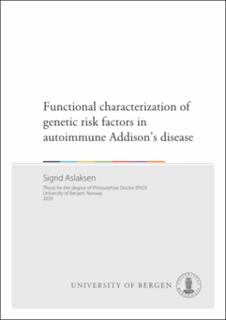| dc.contributor.author | Aslaksen, Sigrid | |
| dc.date.accessioned | 2020-10-13T14:26:07Z | |
| dc.date.available | 2020-10-13T14:26:07Z | |
| dc.date.issued | 2020-10-23 | |
| dc.date.submitted | 2020-10-01T14:14:51.576Z | |
| dc.identifier | container/f9/53/61/0a/f953610a-0004-4594-b890-e3b1e0f9f581 | |
| dc.identifier.isbn | 9788230856277 | |
| dc.identifier.isbn | 9788230844601 | |
| dc.identifier.uri | https://hdl.handle.net/1956/24140 | |
| dc.description.abstract | Autoimmune diseases occur when the immune system attacks and damages the body’s
own tissue. Why people develop these diseases, and how the autoimmune reaction
develops are unanswered questions. Autoimmune Addison's disease (AAD) is an
organ-specific autoimmune disorder characterized by an immunological attack of the
adrenal cortex. The complex genetic architecture underlying AAD has not been entirely
established, and the overall aim of this project was therefore to identify and
functionally characterize genetic risk factors in AAD.
We discovered several rare and damaging inborn errors of antiviral immunity in AAD
patients. Among them, variants in the gene encoding Toll-like receptor 3 (TLR3),
which recognizes double-stranded RNAs (dsRNAs) upon viral infection. Functional
characterization of the TLR3 variants revealed a partial loss of function effect on the
receptor’s signaling activity, leading to impaired interferon (IFN) responses ex vivo.
Next, we identified a homozygous stop-gain variant in the gene encoding 3βhydroxysteroid dehydrogenase type 2 (3βHSD2), causing a rare form of congenital
adrenal hyperplasia (CAH). The mutation was carried by an AAD patient with
circulating antibodies against the major AAD autoantigen 21-hydroxylase (21OH). To
our knowledge, this combination represents a novel disease etiology.
Finally, we wanted to identify HLA-specific immunodominant epitopes of 21OH,
targeted by autoreactive T cells. We discovered a new immunodominant epitope,
ARLELFVVL (21OH434-442), presented by HLA-C*0701. This is the first HLAC*0701 restricted epitope described for a self-antigen in an autoimmune disease. We
also confirmed the presence of autoreactive CD8+ T cells responses to the previously
proposed epitope LLNATIAEV (21OH342-350), restricted to HLA-A2.
Altogether, the work in this doctoral dissertation has provided new insights
into why certain individuals might be more genetically susceptible to develop AAD,
and partly how the autoimmune reaction progresses. | eng |
| dc.language.iso | eng | eng |
| dc.publisher | The University of Bergen | eng |
| dc.relation.haspart | Paper I: Sigrid Aslaksen, Anette B. Wolff, Magnus D. Vigeland, Lars Breivik, Ying
Sheng, Bergithe E. Oftedal, Haydee Artaza, Beate Skinningsrud, Dag E.
Undlien, Kaja K. Selmer, Eystein S. Husebye, Eirik Bratland (2019).
Identification and characterization of rare Toll-like receptor 3 variants in
patients with autoimmune Addison's disease. Journal of Translational Autoimmunity, 1, 100005. The article is available in the thesis file. The article is also available at: <a href=" https://doi.org/10.1016/j.jtauto.2019.100005" target="blank"> https://doi.org/10.1016/j.jtauto.2019.100005</a> | eng |
| dc.relation.haspart | Paper II: Sigrid Aslaksen, Paal Methlie, Magnus D. Vigeland, Dag E. Jøssang, Anette B.
Wolff, Ying Sheng, Bergithe E. Oftedal, Beate Skinningsrud, Dag E. Undlien,
Kaja K. Selmer, Eystein S. Husebye, Eirik Bratland (2019).
Coexistence of congenital adrenal hyperplasia and autoimmune Addison’s
Disease. Frontiers in Endocrinology, 10, 648. The article is available at: <a href="http://hdl.handle.net/1956/23798" target="blank">http://hdl.handle.net/1956/23798</a> | eng |
| dc.relation.haspart | Paper III: Alexander Hellesen and Sigrid Aslaksen, Lars Breivik, Ellen Christine
Røyrvik, Øyvind Bruserud, Kine Edvardsen, Karl Albert Brokstad, Anette
Susanne Bøe Wolff, Eystein S. Husebye, Eirik Bratland (2020).
Circulating 21-hydroxylase-specific CD8 + T cells in autoimmune
Addison’s disease are predominantly restricted by HLA-A2 and HLA-C7
molecules. The article is not available in BORA. | eng |
| dc.rights | In copyright | eng |
| dc.rights.uri | http://rightsstatements.org/page/InC/1.0/ | eng |
| dc.title | Functional characterization of genetic risk factors in autoimmune Addison’s disease | eng |
| dc.type | Doctoral thesis | eng |
| dc.date.updated | 2020-10-01T14:14:51.576Z | |
| dc.rights.holder | Copyright the Author. All rights reserved | eng |
| dc.contributor.orcid | 0000-0003-2349-7884 | |
| fs.unitcode | 13-25-0 | |
